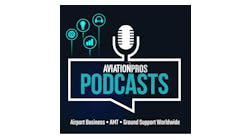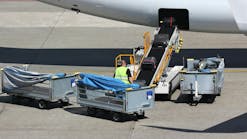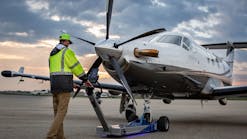Minister's Delegate
Aircraft Maintenance and Manufacturing
By Tony Soulis
July 1999
Tony Soulis is Transport Canada's chief, aircraft maintenance engineer, licensing & training, with the Aircraft Maintenance & Manufacturing Branch of Transport Canada in Ottawa. E-mail questions or comments to [email protected] Among the various delegations issued by the Minister supporting civil aviation, several relate to aircraft maintenance and manufacturing regulatory functions. Let's look at some of these delegations to understand their role in the regulatory process.
For simplicity purposes, they may be identified under functional titles as follows: Minister's Delegate - Flight Permit Authorization (MD-FPA); Minister's Delegate - Maintenance (MD-M); Minister's Delegate - Production (MD-P); and Minister's Delegate - Recreational Aviation (MD-RA). Each of these delegations are held by qualified individuals in the private sector who have demonstrated their ability to perform these regulatory functions, and who have extensive experience in their particular field associated with the delegation. As well, some are linked to organizations while others are stand-alone and work as independents. The point to remember here is that all of the delegations are given to individuals — not organizations.
In many instances a Delegate may be engaged in other aviation activities. However, when exercising delegated authority on behalf of the Minister, there are strict rules of conduct that apply. In all instances, these delegates issue aviation documents on behalf of the Minister, and while some of the delegations have been around for some time, others are relatively new. In any case, all have recently undergone a name change to more appropriately reflect their area of responsibility. So this is a good opportunity to get acquainted with the new titles, as well as some of the characteristics associated with their roles. I'm sure that many of you will recognize some of the delegations under their former title.
So where and when is delegate authority used?
First, we should understand that the Minister might consider issuing a delegated authority where the Minister has determined that there is
a demonstrable need. That need will in all probability be related to levels of service for the aviation industry with regard to safety. Accordingly, while the Minister retains ultimate authority to delegate, in reality this responsibility is further delegated to regional managers who must have first-hand knowledge regarding levels of service and other information related to their program delivery. Therefore, the decision to delegate and when that delegation is needed may vary from one geographical area to another — dependent upon individual regional requirements. As well, demand may be further influenced by workload variances among the different aviation sectors. Nevertheless, unless otherwise limited by the delegation itself, (and some are very focused or limited in nature) delegations once issued from a regional office are national in scope and authority.
As is the case with all delegations issued by the Minister; scope, privileges, and limitations are referenced in a specific schedule within the external Ministerial Delegation of Authority Document. This document is amended from time to time and as such, it is important that reference is always made to the appropriate and latest document number. In addition, a cover letter and credentials sent to the delegate by the issuing TC official will further identify additional limitations or other particulars related to the issuance. As such, when a successful candidate receives delegated authority, the authorization will make specific reference to that document and its applicable schedule.
Here is a quick recap of the Aircraft Maintenance and Manufacturing delegated authorities that are currently available, and bear in mind that an MD may have one or more of these.
Under CAR 507.02, the MD-M may issue a certificate of airworthiness C of A with respect to an aircraft for which an aircraft type design has been certified pursuant to Subpart 511, and the certification is not restricted or provisional. The MD must ensure that the aircraft conforms to its certified type design and is safe for flight.
Under CAR 507.03, the MD-RA may issue a special C of A with respect to amateur-built aircraft that meets the criteria for one of the classifications specified in Chapter 507 of the Airworthiness Manual. The MD must ensure that the aircraft is designed and constructed in conformity with the requirements of Chapter 549 of the Airworthiness Manual and is safe for flight.
Under CAR 507.04, the MD-FPA may issue a flight permit with respect to an aircraft that meets the criteria for one of the classifications of a flight permit specified in Chapter 507 of the Airworthiness Manual. The MD must ensure that the aircraft is safe for flight.
Under CAR 509.03(1), the MD-P may issue an export airworthiness certificate for a new aircraft that conforms to the type design specified in a type certificate issued pursuant to Subpart 511; or for another type design specified in the application where the aircraft is being exported to a state with which Canada has entered into an agreement that provides for the acceptance of export airworthiness certificates, and the aircraft conforms to any special requirements specified by that state. As well, under CAR 509.03(2), the MD may issue an export C of A for a new aircraft, specifying a non-conformity to the applicable type design or any special requirement, where the importing state has indicated a willingness to accept the non-conformity.
Once nominated by the Minister, the MD is subject to strict regulatory guidelines that ensure professional conduct, objectivity, and clear vision in the performance of their work. Documented policy and procedures manuals, audits of issued certificates, and the control of Ministerial Seals, further ensure that procedures are properly followed. As well, the MD is required to respect strict conflict of interest guidelines such that perceived or real conflict is avoided. In that regard, they must also be aware of, and respect other legislation such as the Criminal Code, Human Rights, and the Privacy Acts.
In all, Minister Delegates perform a vital function and are increasingly becoming a valuable instrument in the delivery and support of regulatory programs. For more information regarding this subject matter and other regulatory program information, visit our civil aviation web site. www.tc.gc.ca.





